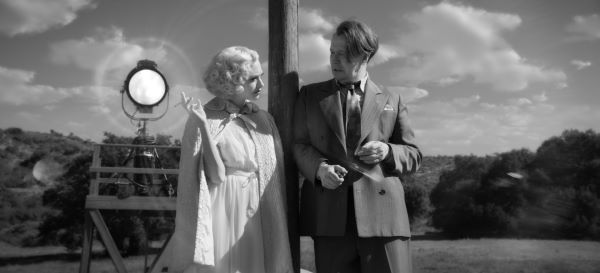

Great works of art arouse admiration for its content. They also elicit questions on how or why someone made it. Citizen Kane has its share of behind-the-scenes rumors, speculations, and mythology. One main query is the debate around the authorship of the screenplay beyond the officially credited collaboration between Orson Welles (genius boy debuting in Hollywood as an outsider) and Herman Mankiewicz (a veteran screenwriter who knew the industry well). Sadly, Mankiewicz’s name has been obscured by Kane’s legacy in direct relation with its director. So now—80 years later—Mank provides a refreshing vision of Mankiewicz (splendidly performed by Gary Oldman) that honors his life and contribution on his own terms. At the same time, it’s not a rejection of Welles’s legacy.
David Fincher, one of the most ambitious and daring filmmakers working in Hollywood today, offers in Mank an irresistible treat that may be hard to digest for some of his usual admirers because of its pace, subject matter, and rhythm. He directs with a commanding erudition on the 1930s-1940s era portrayed, not merely exhibiting knowledge about Hollywood but also U.S. history and politics. The seamless screenplay was written more than 20 years ago by the late Jack Fincher, the director’s father, who has the solo credit, a fact that almost counts as a wink or a statement of intention to acknowledge who’s responsible for a film’s foundation.
Like Kane, Fincher’s film is a puzzle that toys with time structure, interlocking past and present events with precision and wit. An alcoholic and wasted Mankiewicz has suffered a car accident, severely enough to leave him prostrate with his leg in a cast. During his convalescence, Welles (Tom Burke) contacts him for a job offer (you may have already guessed for what movie), remarking that he will have absolute creative freedom.
Welles has a strategy to obtain the best results from the heavy drinking writer. He orders Mank to live in isolation in the Mojave Desert, only accompanied by a nurse and a typist, where alcohol is restricted. Needless to say, the writer works on a script based on a William Randolph Hearst (Charles Dance) figure, a newspaper mogul. (Mank knew Hearst directly, and he was a frequent guest in the tycoon’s mansion, San Simeon.) Flashbacks complete the riddle of who inspired the characters portrayed in his draft and what betrayals were committed in the process. Unlike Kane, Fincher’s script doesn’t present ever-changing points of view. It sees the world through Mank’s eyes.
What starts as a journey in the writing process in a cut-throat industry becomes a cynical lesson on the effects of fake news, on how a powerful tool like cinema can cause damage in the real world. A good portion of the flashbacks are centered on the role of Hollywood during 1934 California governor’s race between Republican Frank Merriam and Democrat Upton Sinclair, in which MGM honcho Louis B. Mayer (Arliss Howard) throws all his weight behind Merriam. The creation of fabricated news footage by MGM is presented here as an impactful tool of a countercampaign against Sinclair.
The monochrome black-and-white cinematography (shot in digital) by Erik Messerschmidt is one of the most beautifully shot movies of the year. Contrary to what that description may suggest, Mank doesn’t look or feel like an anachronistic artifact intentionally emulating the films from a particular time. It’s not The Artist at all.
Many will declare that this is a movie too pretentious or long for its own sake. A persuasive case on why Mank is one of the best films of 2020 demands certain recognition that disillusionment (shared with Oldman’s Mankiewicz) is an intended part of its charm. There are no surprising set-pieces here, but it’s hard not to get seduced by a stroll around MGM with Mayer as a guide or the final goodbye between two improbable friends, the cynical Mankiewicz and the pragmatic actress Marion Davies (Amanda Seyfried, the heart of the film).
Mank is the kind of not-for-everyone film from a respected and well-established director who may play against expectations in every turn—Welles has less of a presence than might be expected, and there’s nothing about Citizen Kane’s actual production. Nevertheless, the film looks and sounds amazing on the big screen. Whether you watch it on Netflix (but don’t miss it in theaters if you have the chance), it shouldn’t tarnish the value of a new and terrific entry in Fincher’s filmography.
















Leave A Comment